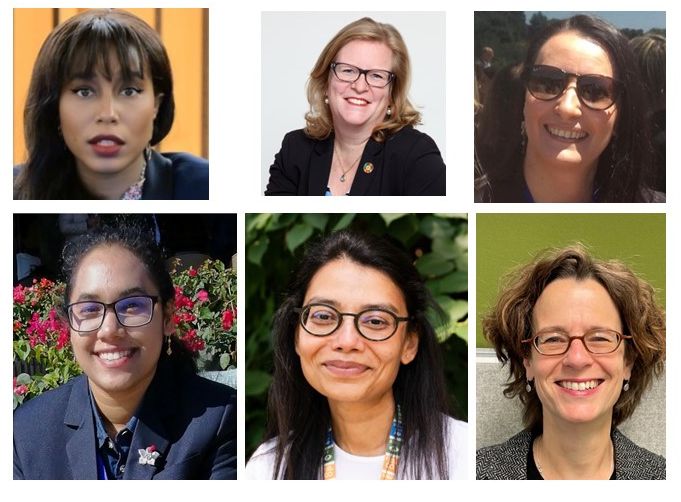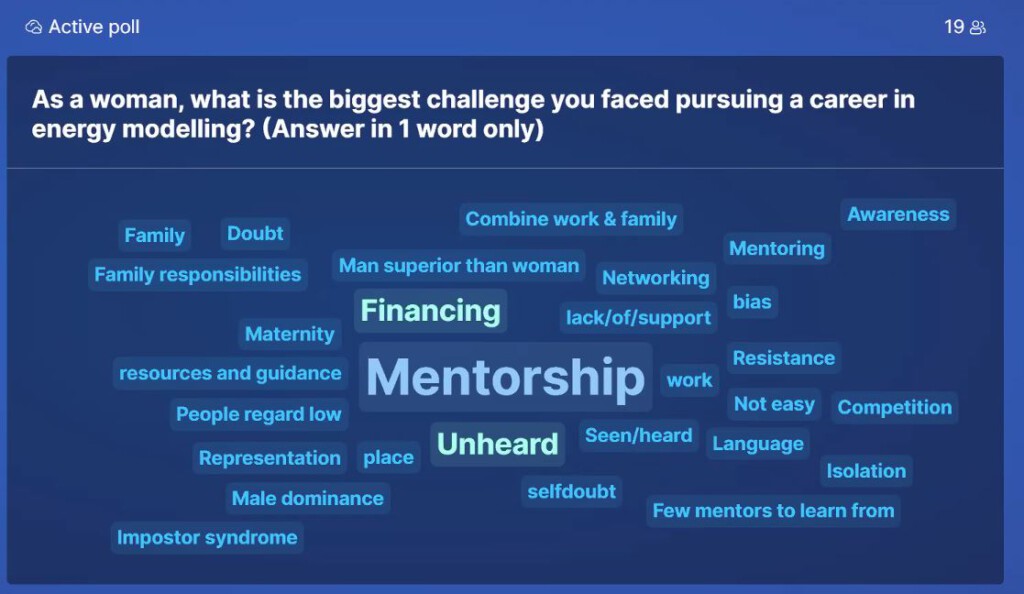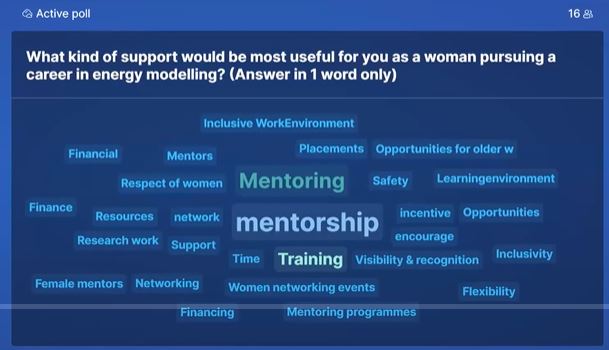On 23 October CCG held a webinar called ‘Women in Energy Modelling’ as part of the Energy Modelling Community (EMC) activities. It was attended by 48 participants. The panel consisted of Bibi Nabilah Hassen, Researcher/Doctoral Student, University of Mauritius and EMP Alumna; Nadia Ouedraogo, PhD, Economic Affairs Officer, United Nations Economic Commission for Africa; Christine Lins, Executive Director, GWNET: Global Women’s Network for the Energy Transition; Payal Patel, Associate Programme Officer, TWAS – The World Academy of Sciences. Chair, Vivien Foster (International Partnerships Lead for CCG) and Principal Research Fellow, Centre for Environmental Policy at Imperial College, London gives us a summary of what happened.

We were delighted to have such a diverse panel representing women at different stages in their careers from different continents and giving a country, regional and international perspective. This was one of our first events for the Energy Modelling Community (EMC) so we were very interested to see what response it would get.
During the webinar we asked some questions to which participants gave their responses, creating a poll of the most common. The first question was on how challenging women had found it to develop their careers in energy modelling. 44% of the audience said that they had found it “somewhat challenging” and 28% “extremely challenging”.
Each of the panellists spoke about their experiences too with Christine recalling an energy efficiency conference of 100 people at which she was the only female delegate. Christine felt that the situation was improving gradually and that “it’s the obligation for all of us to support each other and to make sure that this world gets more gender balanced, not in very small steps, but in quantum leaps.”
Nadia shared her experience of online training during COVID in which she was one of a small number of women taking part: “to have your voice heard was quite challenging when we had group work; I feel sometimes you have to speak louder to have your ideas taken into account. And more generally speaking, it’s challenging for women in technical fields.”
Others also mentioned the lack of role models or mentors and the fact that existing networks are often male dominated. This could lead to “feelings of isolation and self-doubt”, Payal added, and “imposter syndrome where we feel we’re not as capable as our male peers, regardless of our qualifications.” I think many of us identified with that point.
Nabila was among the few individuals at her university to use these tools, so she had to navigate her own way; “energy modelling itself was seen as a softer side of engineering with little recognition of its importance.” Now, though, she felt that the challenges were “rooted in societal transitioning which can cause women to underestimate their abilities and hesitate to advocate for themselves.” She also mentioned a barrier that is common across the sector which is a refusal by others to share their data. “Now, having experienced difficulty on my own, I am committed to sharing my findings with my colleagues. And this has created a greater level of trust and confidence among my peers, including the senior academics who feel more comfortable now to approach me for insights and to work with them.”
I couldn’t resist asking a follow-up question to the panel, as none of them had mentioned family obligations. Christine shared with us that she became a mother late in her career. She commented that her members “often don’t manage to come to the networking part of their jobs because they don’t have enough time, and they consider it a nice thing to do rather than essential”. But her advice was “it will pay off in the long run and it’s something that you should not forget to do.” Later she added that women who are mothers are excellent recruitment candidates for any organisation: “they acquire fantastic skills for management because they have to all the time juggle conflicting priorities and tight schedules. They need to empathise with their children, so they are really good team leaders also.”
The second poll asked the question “what is the biggest challenge you face pursuing the career in energy modelling?” and lack of mentorship came through strongly, alongside networking and financing.

Then we moved the conversation on to the potential solutions to these barriers and the support that may be available.
Payal provided a global view through UNESCO recommending structural change in terms of better diversity and changes in policies to achieve this. She ensures that recruitment campaigns include specific targeting of female candidates and research programmes have specific components for women scientists. UNESCO also have an initiative called “the scientist after child component” in which female PhD holders can apply for grants which include support for a research assistant for 12 months. “We don’t give childcare support, but we give support for research assistance so that the mother can stay at home with her child (directing her research) rather than hire a nanny or a babysitter. UNESCO also has a programme where the interdisciplinary research team must comprise one woman and one man.
Christine explained the work of GWNET which includes a mentoring programme that has mentored over 900 women since 2018, and study tours which help to bring women in energy together. Nabila talked about the value she found from attending the Energy Modelling Platform for Africa (EMP-A) organised by CCG, which created a network for her.
Nadia echoed the value of networking in her own career, alongside continuous learning which helps her overcome imposter syndrome feelings. Her organisation – the UN – has been advocating for gender parity for several years and has an ambition of a 50:50 gender split.

When we turned to questions from the audience, the panel were asked to recommend professional organisations that women could usefully join. Christine explained that GWNET is a free membership-based organization, with over 4,500 members from 150 countries, that also gives members access to various national and regional women in energy networks.
Payal recommended the Organization for Women in Science for the Developing World which has over 10,000 women members from all over the world, with national chapters. The female leadership programme also offers leadership coaching.
I mentioned that as part of the Energy Modelling Community, we are exploring the possibility of mentoring as we have approximately 200 women who are energy modellers.
We reluctantly drew the webinar to a close after an hour but very much with the feeling that we had started to meet a genuine need and with ideas forming about doing more in the future.
If you missed the webinar or would like to watch it again, it’s on our YouTube Channel.
